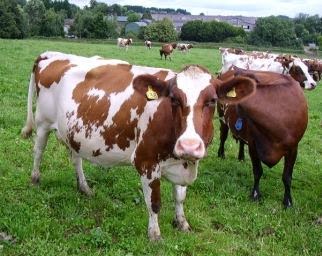by TIM REED
 What do Dame Sally Davis (the United Kingdom’s Chief Medical Officer), Prue Leith (restaurateur, television presenter/broadcaster and writer), Joe Wood (model, television personality and entrepreneur) and me, HAI’s director, have in common?
What do Dame Sally Davis (the United Kingdom’s Chief Medical Officer), Prue Leith (restaurateur, television presenter/broadcaster and writer), Joe Wood (model, television personality and entrepreneur) and me, HAI’s director, have in common? No, not an abiding love of cows (although they arevery cute), but an overriding professional and personal interest in the overuse of agrochemicals and medicines in farming, particularly the overuse of antibiotics.
Last week, the people mentioned above, along with 12 other guests, were invited to tour Prince of Wales’ farm and gardens at Highgrove last week to hear how contemporary farming can be sustainable with crop rotation—and without the use of pesticides and chemical fertilizers. Did you know, for example, that one crop of red clover will provide enough nitrogen in the soil to grow four years of cereals? And the sheep and cattle can graze it! Moreover, the farm has long since stopped routine prophylactic use of antibiotics in favour of sustainable good animal husbandry. Now, I’m no expert, but they all looked pretty healthy to me.
 After the walking tour of the farm, we were escorted around Highgrove Gardens, where everything is designed in accordance with the holistic and environmentally-sustainable ethos of His Royal Highness. It has to be said that it is beautiful, and leaving plants to do their own thing with minimal intervention is clearly a much healthier way to design a garden. It didn’t turn me into a gardener, but almost.
After the walking tour of the farm, we were escorted around Highgrove Gardens, where everything is designed in accordance with the holistic and environmentally-sustainable ethos of His Royal Highness. It has to be said that it is beautiful, and leaving plants to do their own thing with minimal intervention is clearly a much healthier way to design a garden. It didn’t turn me into a gardener, but almost.There was, of course, a serious side. I was a guest of the Sustainable Food Trust, which joined HAI as inaugural members of the Antibiotic Resistance Coalition (ARC) whose mandate is to tackle global antibiotic resistance by integrating four core pillars: antibiotic use in humans; antibiotic use in animals; antibiotics and the environment; and innovation of new antibiotics. Not only was the visit an opportunity for HAI to meet with the United Kingdom’s most influential people in the field of antibiotic use reduction, we received a lecture and a working lunch on ‘what next?’ How can the Sustainable Food Trust build public awareness and change perceptions of organic food and educate the public that the animals we consume don’t have to be pumped full of antibiotics from day one?
Although the jury is still out on the direct causality between the food we eat, the consumption of the antibiotics they eat, and antibiotic resistance, one thing is for sure: farm animals do carry antibiotic resistant bacteria as a result of the overuse of antibiotics, and it is on the surface of much of the food that we buy and consume. So, one way or another, antibiotic use in the food chain must be reduced dramatically if it is not to simply compound the problem of resistance in humans, brought about by their irrational use ever since they were discovered.
Oh yes, and there was a cream tea!
I am grateful to the Sustainable Food Trust for this fabulous opportunity to meet with such influential and interesting people.